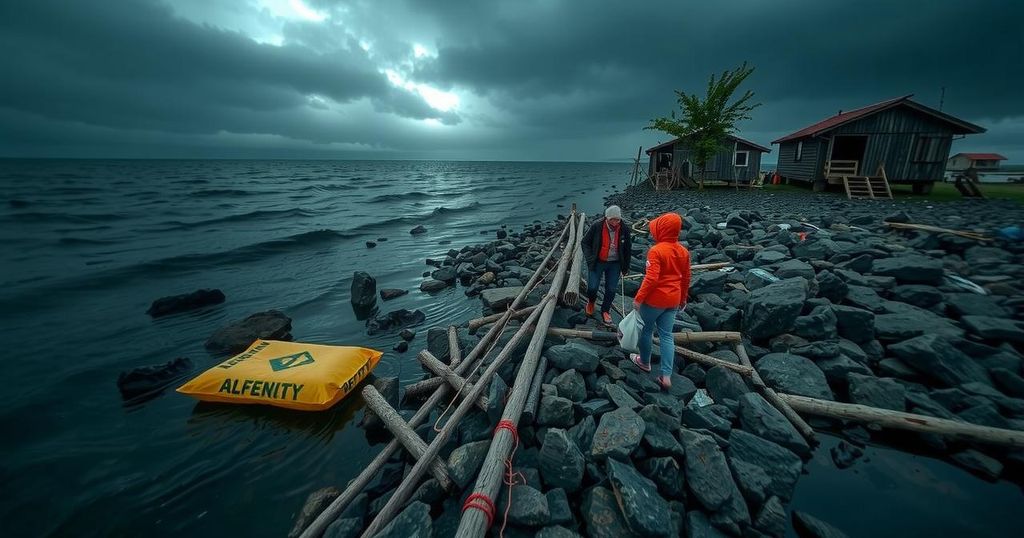The UN reports that climate change is aggravating global displacement, with extreme weather events displacing millions and worsening conditions for refugees. The organization highlights the urgent need for increased funding and support for vulnerable communities as international climate negotiations continue.
The United Nations has emphasized that climate change is exacerbating the global refugee crisis, displacing record numbers of individuals from their homes. As international climate discussions proceed in Baku, the UN refugee agency reported that increasing global temperatures and extreme weather conditions are not only heightening displacement figures but are also intensifying the already precarious living situations of refugees. A recent report from UNHCR indicates that climate-induced catastrophes, particularly in regions like Sudan, Somalia, and Myanmar, intersect with existing conflicts, further endangering vulnerable populations. Filippo Grandi, the head of UNHCR, remarked in the report’s preface, “Across our warming world, drought, floods, life-threatening heat, and other extreme weather events are creating emergencies with alarming frequency.” He highlighted the plight of displaced individuals, stating that 75 percent of these individuals reside in nations severely impacted by climate-related risks. As climate change accelerates, the number of displaced people is projected to rise significantly. Currently, an unprecedented 120 million people are forcibly displaced due to violence, persecution, and war, with most being internally displaced within their own nations. Over the past decade, weather-related disasters have displaced approximately 220 million individuals, translating to an alarming average of 60,000 displacements each day. “We are just seeing more and more and more people being displaced,” lamented Andrew Harper, UNHCR’s special advisor on climate action, pointing to an insufficient level of funding for supporting displaced individuals and their host communities. Most refugee settlements are situated in less affluent nations, which are often located in disaster-prone areas lacking the necessary infrastructure to combat the escalating impacts of climate change. UNHCR projects that by the year 2040, the number of nations facing extreme climate-related dangers may increase from three to 65, with the majority housing displaced populations. Furthermore, by 2050, many refugee camps are expected to experience a doubling of dangerously hot days, escalating health risks and threatening food security by causing crop and livestock failures. In light of these alarming trends, UNHCR is urging leaders at COP29 in Baku to allocate a greater portion of international climate funding to assist both refugees and their host communities. Currently, fragile states receive approximately $2 per person in annual adaptation funding, in stark contrast to $161 per person allocated to non-fragile states. Harper emphasized the necessity of investing in climate resilience to counteract inevitable displacement, stating, “If we do not invest in peace, if we do not invest in climate adaptation in these areas, then people will move. It is illogical to expect them to do anything different.”,
The article discusses the intertwined relationship between climate change and global displacement, as highlighted by the United Nations High Commissioner for Refugees (UNHCR). With the ongoing international climate negotiations, the UN emphasizes the urgency of addressing both the refugee crisis and the growing impacts of climate extremes, noting that the challenges of climate change are significantly worsening the conditions under which displaced individuals must survive. As natural disasters become more frequent due to climate change, the report indicates that proactive measures are essential to alleviate the adverse effects and support vulnerable communities.
In conclusion, the UN has underscored the alarming reality that climate change is significantly worsening the global refugee crisis. The increasing frequency of extreme weather events and climate-related disasters is intensifying the adversities faced by already vulnerable populations. Urgent investment in climate resilience and adaptation is crucial to support both the displaced individuals and their host communities, as neglecting these issues will only exacerbate the growing humanitarian crisis. The need for international cooperation and funding is more critical than ever to address the confluence of climate change and forced displacement.
Original Source: www.latintimes.com






